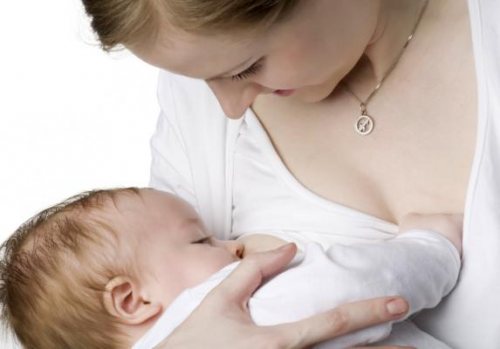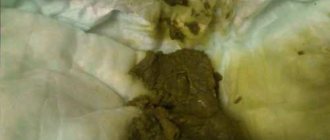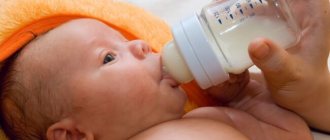What is diarrhea?
In a healthy baby who fully feeds on mother's milk, a liquid mass forms after food enters the small intestine. Electrolytes and excess fluid are absorbed in the colon. As a result, healthy stool is formed. If there is a disturbance in the gastrointestinal tract of the newborn, excess fluid is not absorbed, and diarrhea develops.
Premature babies develop diarrhea more often
Diarrhea itself is not an independent disease. The deterioration of intestinal function is often due to the fact that the small organism has not yet adapted to the new conditions outside the womb. The functional immaturity of blood enzyme systems leads to the fact that food (breast milk) is not fully digested. As a result, diarrhea develops. The symptom itself is not dangerous. However, if measures are not taken in a timely manner, the water and electrolyte balance in the baby’s body may be disrupted. And this condition is already life-threatening.
Most often, weakened and premature babies have to deal with diarrhea. Even a minor mistake in the mother’s diet can lead to the development of unpleasant symptoms in the baby. Parents should know what healthy newborn stool should look like in order to identify abnormalities as quickly as possible.
As soon as the baby is born, the stool may be dark brown. This is due to the fact that amniotic fluid has entered the gastrointestinal tract. The very next day, the stool becomes light yellow. Their consistency resembles liquid semolina porridge. The normal number of bowel movements per day is up to 10 for a child in the first month of life.
If the baby is fed formula, the number of bowel movements is 5–6 times a day.
Frequent stools with mucus and lumps are a reason to consult a pediatrician. And if the stool also acquires an unpleasant odor, or the number of bowel movements has increased significantly, you should seek medical help immediately.
Loose stools in a newborn: normal or not?
- frequency of bowel movements;
- quantity;
- consistency;
- color;
- smell;
- process of bowel movement.
We will not take into account baby's stool in the first days of life. At this time, the baby defecates thick, dark-colored feces - meconium, or, as it is also called, original feces. This indicates that the child’s intestines have begun their responsible work.
So, normal feces in a breastfed baby are characterized by:
- Frequency of bowel movements: a baby in the first weeks of life can poop up to 10 times a day, after the introduction of complementary foods - 2-3 times a day.
- The amount of feces: small children defecate often, but little by little, after the introduction of complementary foods, the amount of poop is inversely proportional to the frequency of bowel movements.
- Consistency. The baby is now eating liquid food - your milk. Accordingly, his feces will be mushy, semi-liquid, liquid. Very rarely, babies end up with “thick” yellow poop, somewhat similar to plasticine. After introducing complementary foods, the feces become thicker, and over time you will see the long-awaited “sausages” in the diaper.
- Color. A healthy breastfed baby's poop may be any shade of yellow. Sometimes there are white spots in them - not fully digested “excess” milk (the baby just ate too much). With the introduction of complementary foods, the feces begin to darken; by the age of one and a half years, an infant poops completely “like an adult.”
- The smell. While the baby eats your milk, his stool does not smell at all. There may be a slight milky or sour tint in the smell, but this is also within the normal range, because milk actually sours in the baby’s stomach and intestines, being digested in this way.
- The process of defecation. Normally, the baby poops calmly, pursing his lips slightly and pushing slightly. The process does not cause tears or screams.
Loose stool in a newborn baby or in a slightly older breastfed child is a variant of the norm, in which there is no need to worry. The baby eats liquid food, and there is simply nothing to form the “sausages” so desired by every mother.
Infants
Parents often worry about loose stools in their newborn. But it is important to understand that breastfeeding is normal physiology. There is no need to worry if there are no other signs of a condition disorder.
There are situations when loose stools in a breastfed baby indicate the development of diseases, but this condition is always accompanied by additional external signs.
It’s very easy to explain why a newborn’s stool is loose when breastfeeding. When eating only high-calorie, soft and fatty foods, feces cannot harden. A mushy consistency is normal until complementary feeding is introduced in infants.
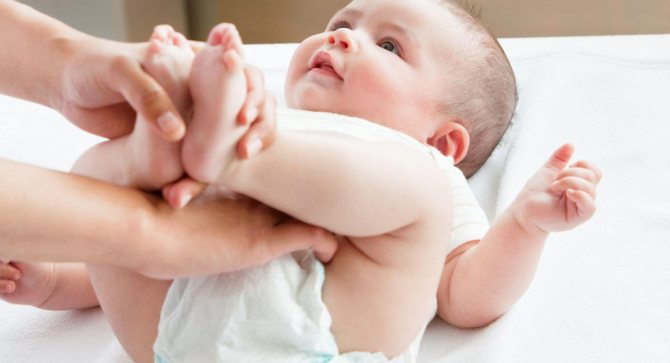
The shade ranges from yellow to light brown. At times, the color may change, but if there is no mucus or blood in the stool, and if there is no pain in the tummy, then everything is fine.
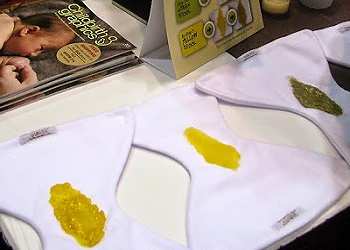
Stool color varies from light yellow to dark brown
If a newborn has loose yellow stools, but the baby has good dynamics in weight gain, has no problems sleeping and does not show alarming signs, then his parents should not worry in vain. The baby eats liquid, easily digestible food and therefore it is logical that the feces are liquid. This should not be associated with diarrhea.
A breastfed baby can normally defecate 7 to 10 times a day in the first month of life. Bowel movements occur after feedings. From 1 to 6 months, the baby goes to the toilet 2-5 times every day, and after six months - 1 or 2 times, and maybe less often.
With frequent pathological bowel movements, the baby quickly loses the fluid it needs. At this time, the baby needs to be given a lot of water to prevent dehydration and disturbances in the functioning of organs and systems.
If a newborn has loose stools, behaves restlessly, cries often and heavily, or has a bloated tummy, you should urgently call a doctor.
Normally, a baby has loose yellow stool, but it can be greenish, light yellow or brownish. The color depends on the nutrition of the nursing woman. When dairy products are included in her diet, the feces are yellow, and plant products are greenish.
The norm is the absence of mucus and blood in the stool. Sometimes curdled lumps may appear, and the smell is like sour milk. If the baby is feeling well and has a stable weight gain, there is nothing to worry about. This is a natural response to easily digestible food.
Diarrhea can be distinguished from a normal physiological state by the following characteristics:
- increase in the number of bowel movements per day;
- stool liquefaction and wateriness;
- sudden release of feces;
- pronounced sour odor;
- green tint;
- the presence of blood streaks, foam and mucus.
At the same time, it is recommended to monitor the child’s general well-being.
- colic and gas;
- sleep disturbance during the daytime and at night;
- poor appetite;
- causeless whims;
- rise in temperature.
But often the color and consistency of feces in a normal state will depend on the individual characteristics of the baby’s body.
A baby's stool is normal if it does not cause any disturbances accompanied by a deterioration in the child's condition. Feces can have different consistency and color - yellow, green, brown.
If there are changes in the color of the stool, there is no need to worry, because this is how the baby’s body reacts to the food received from the mother. For example, if a nursing woman consumes dairy foods, the baby will react to her milk with yellow stools, and when eating plant foods, the stool will turn green.
However, discharge accompanied by blood or mucus is not normal, so if you notice these inclusions, you should immediately consult a doctor.
Signs of normal stool:
- the child's well-being;
- stable weight gain;
- deep sleep;
- lack of restless behavior.
Also, parents of a newborn need to take into account that during the first 4 weeks of life the baby often poops, and this process can occur approximately 10 times per day. Many children defecate after every meal. From 2 to 6 months, the frequency of bowel movements decreases to 3-5 times. After 6 months, children poop 1-2 times a day in small volumes.
Causes of loose stools in infants
In a newborn baby (especially a premature one), diarrhea can be caused even by opportunistic microorganisms that are not dangerous for older children. Such microflora can enter the baby’s gastrointestinal tract if the mother does not follow hygiene rules (gives the baby a dirty pacifier, does not pay attention to cleanliness of the breast before feeding). Intestinal infections are the most common cause of diarrhea in newborn babies. Other common causes of diarrhea include:
- food intolerance (if the mother does not adhere to a diet during lactation);
- reaction to certain medications (most often antibiotics);
- cold (ARI);

If a woman does not follow a diet, the baby may develop diarrhea
Predisposing factors for the development of diarrhea include:
- Relatively long intestine. If pathogenic microflora or toxins enter the baby’s gastrointestinal tract, there is a high probability of their absorption into the blood.
- Underdeveloped defenses of the baby's body.
- Immaturity of enzyme systems that break down food.
Often, diarrhea in infants in the first month of life develops against the background of an unhealthy emotional atmosphere in the family. If the mother is worried, the baby is also nervous. The child’s body reacts to troubles by disrupting the functioning of the gastrointestinal tract.
Why might a newborn have frequent loose stools?
There are several reasons for this condition.
- Viral infection. Most often, rotavirus infection occurs in children in the first year of life. The child develops frequent loose, watery stools, vomits several times a day, and the body temperature rises. The general condition of the child is impaired due to dehydration. He becomes whiny, capricious, the skin is dry, the fontanel is below the level of the skull bones. The color of stool can vary from yellow to gray.
- Acute intestinal infection. This is a serious illness for a newborn baby. The baby quickly loses fluid along with feces, which can threaten his life. The disease manifests itself with a sharp increase in body temperature, vomiting or frequent regurgitation, and general malaise. The child refuses to eat, the skin is pale, sometimes with a gray tint. In addition to dehydration, an intestinal infection is dangerous by poisoning the body with bacterial toxins. If you do not consult a doctor in a timely manner and delay treatment, a newborn baby may die.
- Functional dyspepsia. Pediatricians do not consider this condition to be a serious disease. However, it can lead to consequences in the form of dehydration. Dyspepsia occurs as a result of a violation of the diet by a nursing mother or incorrect, irrational introduction of complementary foods to the baby, as well as against the background of teething. Dyspepsia manifests itself in the form of frequent loose stools, bloating, and an admixture of undigested lumps of food in the stool. The child's general condition is normal, body temperature is not elevated.
- Intestinal dysbiosis. The baby's intestines are sterile immediately after birth. Starting from 1–2 days of life, the intestines are gradually colonized by microflora. When the balance of these bacteria is disturbed, a disease called dysbiosis develops. It manifests itself in the form of flatulence, loose stools, sometimes mixed with greens, and rumbling in the stomach. The disease requires a thorough examination to determine the cause of dysbiosis.
- Extraintestinal infections. Often, pharyngitis, otitis, pneumonia or bronchitis can be accompanied by frequent loose bowel movements. Sometimes this is the only symptom, so at the first sign you need to consult a doctor to determine the cause of the disease.
Signs of diarrhea in newborns while breastfeeding
If the number of bowel movements has increased, but the baby feels fine, sleeps well and is not capricious, there is no need to sound the alarm. But for prevention, it is still recommended to consult a pediatrician. Seek immediate help if your baby develops the following symptoms:
- anxiety or, conversely, lethargy;
- redness and irritation around the anus;
- increased body temperature;
- vomit;
- active seething in the stomach;
- stool with a lot of water, foamy, with an unpleasant odor and admixtures of mucus or blood.
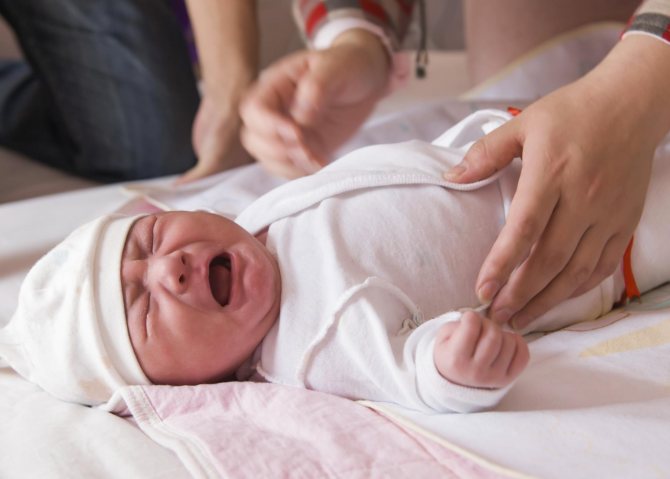
If the number of bowel movements has increased, or the child behaves restlessly, it is worth visiting a doctor
Mothers should also know the signs of dehydration in their children. If a newborn has a sunken fontanel, he cries without tears, and the oral mucosa is dry, you need to call an ambulance.
Loose stools in a breastfed baby: is it normal or does it need to be treated?
Loose stools are a natural reaction of the body to the nutrition the baby receives from the mother. Babies often suffer from loose, frequent stools, and this is the norm if the frequency does not exceed 15 times a day, and the baby is entirely breastfed.
Normal stool consistency:
- yellow homogeneous gruel or sour cream when feeding a nursing mother with a predominance of dairy products: kefir, milk, cheeses,
- a rich yellow-green hue if plant foods predominate in the diet (fruits, herbs, vegetables), but without the presence of mucus, blood lumps, or a cheesy consistency.
It is acceptable to pass stool in sausage form or in small white lumps in case of indigestion of breast milk, or to pass stool of a mushy, dense consistency with greenish-yellow-orange inclusions.
At the same time, the baby is gaining weight well, is quite active, cheerful, and is not capricious.
The main thing is that there are no other unpleasant symptoms:
- excessive worry
- sleep disorder,
- weight loss,
- insomnia.
There may be a slight odor in the stool in the form of sour milk, but this is a natural reaction of the body to digestible, easily digestible food.
Diarrhea
Taking into account the portions and frequency of feedings, the volume of feces can be increased and passed in small portions. The main thing is to distinguish loose stools from diarrhea, when colic appears, abdominal pain during bowel movements, and the passage of watery stools with a sour smell of a rich green hue.
Obvious signs of diarrhea:
- increased frequency of bowel movements per day,
- passing watery stools with a thicker green consistency, with bloody spots, clots of mucus, foamy discharge,
- the appearance of a sour smell,
- the appearance of colic, pain, hardening of the tummy,
- temperature increase,
- loss of appetite,
- manifestation of anxiety, writhing legs.
If you have diarrhea, you need to see a pediatrician immediately, because this is a sign of the development of an intestinal infection in a small body.
Complications may be indicated by the baby's capriciousness, hardening and bloating of the abdomen, pain on palpation, lethargy, quiet crying, the passage of dark orange urine with a pungent odor, or the absence of urination at all.
Dehydration of the body in infants is observed when the fontanel is sunken.
You can suspect dysbiosis, diarrhea, or rotavirus infection based on the following symptoms:
- redness in the anal area,
- discharge of feces in large pieces,
- the appearance of greenish stools.
The cause of dysbiosis and the appearance of watery stools can be the use of antibiotics and probiotics. This means that it is important for mothers to follow dosages when giving medications to children.
In particular, fruits and vegetables (apples, pears, beets, cucumbers) can cause diarrhea , so mothers need to be extremely careful when introducing new foods into their diet.
If dysbacteriosis is suspected, it is necessary to undergo a bacterial culture test.
Treatment of diarrhea in babies
If a baby shows signs of diarrhea, you should never start therapy on your own. It is necessary to seek help from a pediatrician as soon as possible to determine the cause of this baby’s condition. Before you can see a specialist, you need to do everything to maintain a healthy water and electrolyte balance for your baby. You should not limit the number of breastfeedings. Additionally, you can give your baby boiled water from a spoon.
After making an accurate diagnosis, the pediatrician can prescribe medications from the following groups:
- Antidiarrheal drugs. Smecta shows good results. The medicine can be used from the first days of life.
- Sorbents. These medications remove toxins and harmful substances that trigger the development of diarrhea. Enterosgel may be prescribed.
- Probiotics. Products from this category restore healthy intestinal microflora. Newborn babies can be prescribed Bifiform, Bifidumbacterin, Linex.
- Rehydration drugs. These products restore the disturbed water-electrolyte balance of the baby’s body. Regidron is considered the most effective.
- Antibiotics. These drugs are prescribed if diarrhea is the result of an intestinal infection. Medicines are selected taking into account the sensitivity of pathogenic microflora.
- Antiviral agents. Can be prescribed if diarrhea is a consequence of ARVI. Viferon candles show good results. They are often prescribed even to premature babies.
None of these medications should be given to a newborn baby without consulting a doctor.
Medicines for diarrhea in newborns - photo gallery

Bifiform is a popular probiotic

Regidron will help avoid dehydration

Viferon is an effective antiviral drug

Enterosgel will help remove toxins

Smecta can be used from the first days of life
Diet of a nursing mother
To avoid digestive problems in a newborn baby, a woman during lactation must adhere to certain nutritional rules. The diet of a nursing mother should be especially strict in the first month after childbirth. Immediately after the birth of a baby, a woman is recommended to keep a food diary. This will make it easier to determine what exactly the baby’s body reacted to with diarrhea.
A woman's diet should be nutritious. At the same time, you will have to exclude all potentially dangerous products. A nursing mother's menu may contain:
- any porridge cooked in water;
- steamed lean meat (turkey, rabbit, chicken);
- bananas;
- baked apples;
- vegetable soups;
- boiled vegetables;
- bran bread;
- pasta from durum wheat;
- boiled fish;
- “Maria” cookies, crackers, bagels;
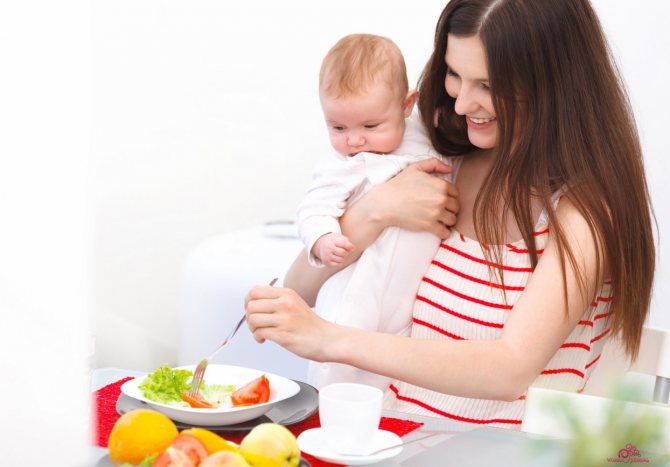
To avoid the development of diarrhea in a child, a nursing mother should adhere to a special diet
Any sweets should be consumed in limited quantities. A week after giving birth, you can include fermented milk products and eggs in your diet. In this case, it is imperative to monitor the baby’s reaction to new food.
A woman should maintain an increased drinking regime. In addition to clean water, you can drink dried fruit compote, weak tea, and dill water. Pharmacies also offer special herbal teas to improve lactation.
In the first months of a baby’s life, a nursing mother should absolutely not consume the following foods:
- chocolate in any form;
- citrus;
- seafood;
- fruits such as melon, grapes, watermelon, pear;
- bright berries (cherries, strawberries);
- cabbage in any form;
- legumes;
- canned foods;
- honey;
- any products containing food additives;
- any too spicy, salty and fatty dishes.
After the baby turns three months old, the woman’s diet can be expanded. New products should be introduced into the menu gradually, observing the child’s reaction.
Folk remedies against diarrhea in infants
You can use any means to treat a newborn baby only in agreement with the pediatrician. Traditional medicine recipes are no exception, although some of them show high effectiveness.
Linden infusion
Pour a tablespoon of dried linden flowers into a liter of boiling water and leave under a closed lid for about an hour. Then the product must be filtered and given to the baby instead of water several times a day. Linden has been famous for its anti-inflammatory and bactericidal properties since ancient times.
Rice water
Many people know that rice holds the stool together. The water in which the cereal was cooked is suitable for treating a newborn. The decoction must be mixed with clean boiled water in a ratio of 1:3 and given to the baby from a teaspoon.
Rosehip flowers
To eliminate diarrhea in a child, it is necessary to prepare a medicinal infusion. Pour two tablespoons of dried flowers into a liter of boiling water and leave under a closed lid for about an hour. Then the product must be filtered and given to the newborn in small portions from a teaspoon.
Mint tea
Pour boiling water over several fresh mint leaves and leave for 20–30 minutes. The cooled tea is given to the baby in small portions.
Any treatment, including using folk remedies, must be carried out under the supervision of a doctor. Therapy is considered effective if the baby’s condition improves the next day, he eats with appetite, and the number of bowel movements is significantly reduced.
Traditional medicine recipes - photo gallery

Linden decoction will help cope with diarrhea

Rosehip flower infusion is an effective remedy against diarrhea

Peppermint tea is a tasty and healthy medicine

Rice water can help stop diarrhea
Treatment prognosis and prevention
If you respond to unpleasant symptoms in a timely manner, the treatment prognosis will be favorable. The most dangerous complication of diarrhea in newborns is dehydration of the small body. Delayed treatment can lead to death. Complications often also arise if therapy with antibiotics had to be carried out. The child may develop allergies or dysbacteriosis.
To avoid having to deal with trouble, mothers should follow simple preventive measures:
- stick to a diet;
- regularly wash your hands, as well as objects with which the child comes into contact;
- Contact your pediatrician promptly if any unpleasant symptoms appear.
When should you contact a pediatrician with loose stools?
Loose stools in a newborn may be evidence of a serious illness that requires urgent treatment. If a baby has loose yellow stools combined with a normal general condition, then there is no need to worry. If other complaints arise, you should immediately contact your pediatrician. Symptoms of diseases that may accompany frequent loose stools:
- Increased body temperature over 380C.
- The baby's stool has changed from mushy to watery.
- A child up to a month has bowel movements more than 10 times a day.
- Unpleasant odor of feces (rotten, putrid, fetid odor).
- Liquid bowel movements are accompanied by vomiting.
- Signs of dehydration appeared - sunken fontanelle, dry skin, crying without tears, cracked lips, dry tongue.
- Stool with mucus, foam, streaks of blood.
- The child refuses to eat and does not gain weight well.
- Loose stools are accompanied by bloating and loud, incessant crying of the baby.
